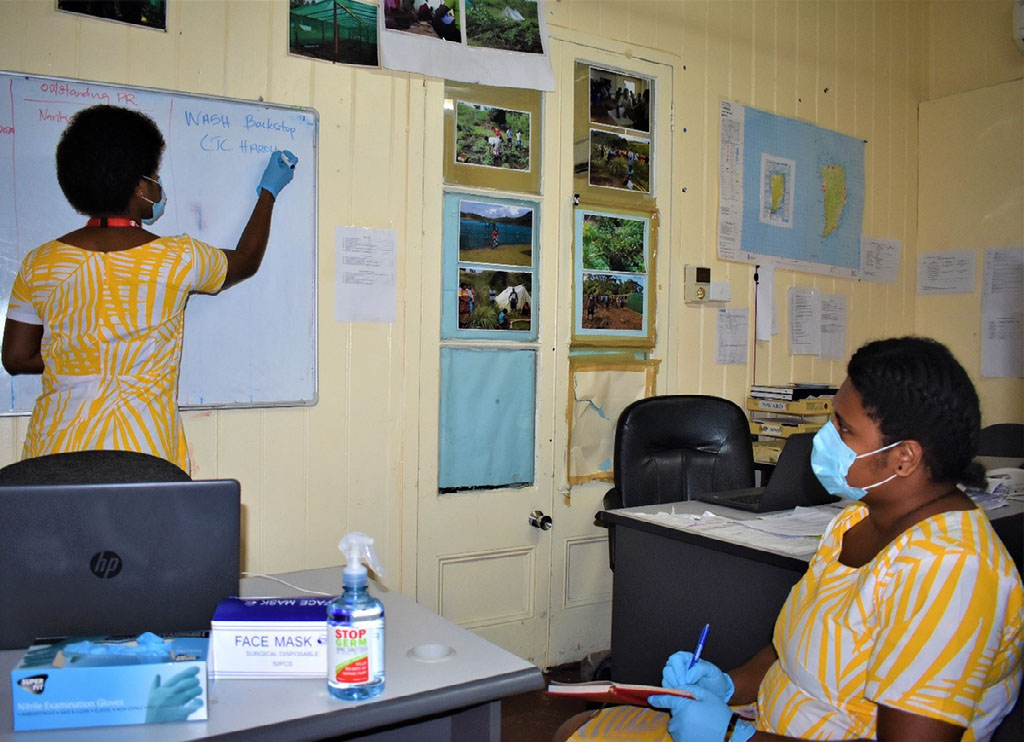The Grand Bargain in Practice: Australia’s investment in preparedness for a more effective, coordinated and inclusive disaster response
 The Australian Humanitarian Partnership contributes to a more resilient Pacific by supporting and building capacity of local and national responders, and increasing preparedness for early action, two of the Grand Bargain commitments.
The Australian Humanitarian Partnership contributes to a more resilient Pacific by supporting and building capacity of local and national responders, and increasing preparedness for early action, two of the Grand Bargain commitments.
One of the Grand Bargain commitments is to use existing resources and capabilities better to shrink humanitarian needs over the long term. This includes significantly increasing prevention, mitigation and preparedness for early action to anticipate and secure resources for recovery (mainstreamed commitments 10). These commitments are embedded in the Australian Humanitarian Partnership (AHP) Disaster READY program, which also underlines engaging with local and national responders in a spirit of partnership to reinforce rather than replace local and national capacities (commitments under workstream 2), and promotes cash modalities when feasible (workstream 3).
Investing in preparedness for a more effective response
Implemented by civil society partners and local networks across the Pacific and Timor-Leste, the AHP Disaster READY program is Australia’s largest investment in disaster preparedness in the region. It is focused on building community-based preparedness and strengthening the leadership and participation of local and national NGOs in response coordination mechanisms. Providing organisational and technical training to local and national partners is critical to building the longer-term capacity and capabilities of local governments, NGOs and civil society to prepare for and respond to disasters. As highlighted by the Humanitarian Coordinator of Australia’s Department of Foreign Affairs and Trade, Mr James Gilling, “the foundations laid by the AHP Disaster READY program have enabled Australia to rapidly scale up support through civil society, to quickly reach people affected by COVID-19 and by cyclones in the Pacific in 2020”.
Result: Strengthened disaster response in Fiji
Since 2017, through the Disaster READY program, AHP partners have provided support to local and national civil society in Fiji, focused on inclusive disaster preparedness and on community-based disaster management.
Strengthened disaster management within communities and national coordinating bodies was evident when several disasters struck in Fiji in 2019 and 2020 (Tropical Cyclone Sarai in December 2019, followed by Tino in January 2020, a pandemic in March 2020, and cyclone Harold in April 2020).
Firstly, local and national responders played an even greater role in the response. From the outset of the program, Disaster READY in Fiji has been working closely with the Fiji Council of Social Services (FCOSS) to support the organisation in its mandated role of organising civil society during disasters. When disasters struck in 2020, in recognition of FCOSS’ increased capacity, the Fiji Government requested it help to fulfil an essential role in supporting community outreach.
Further, with the onset of COVID-19, Disaster READY partners were able to draw on their wide networks of organisations and community leaders to reach communities with essential prevention messages. Partners helped to ensure communities had the tools and information to support safe hygiene and physical distancing practices.
The AHP Disaster READY program also puts significant emphasis on building skills for inclusive responses, working with an LGBTQI advocacy group and Fiji Disabled People’s Federation. This resulted in the use of sign language interpreters in official messages for the first time, following Tropical Cyclone Harold.
The AHP Disaster READY program is an example of Australia’s ongoing commitment to preparedness, localisation and appropriate cash-based programming. Australia promotes engagement with local actors, and works with partners to address barriers to engagement, recognising the importance of learning about the context to understand how to best support local priorities and build stronger partnerships.
Disclaimer: Information in this article was provided to the Grand Bargain Secretariat by Australia.
|
BACKGROUND
|
